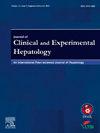2025年肝细胞癌全身治疗的发展前景
IF 3.2
Q2 GASTROENTEROLOGY & HEPATOLOGY
Journal of Clinical and Experimental Hepatology
Pub Date : 2025-03-18
DOI:10.1016/j.jceh.2025.102547
引用次数: 0
摘要
肝细胞癌(HCC)是第六大常见恶性肿瘤,约占肝癌的90%。HCC通常在晚期诊断,这时全身治疗成为主要的治疗选择。随着对肿瘤内分子信号通路和肿瘤微环境的了解不断深入,晚期HCC的治疗选择也越来越具有创新性。目前的治疗靶向细胞通路,包括酪氨酸激酶抑制剂(TKIs),如lenvatinib、sorafenib、regorafenib和cabozantinib,它们破坏肿瘤生长和生存的关键信号;阻断肿瘤血管形成的血管内皮生长因子(VEGF)抑制剂;还有免疫治疗药物,如阿特唑单抗-贝伐单抗、tremelimumab和durvalumab,它们可以刺激免疫系统攻击癌细胞。靶向治疗和免疫治疗,单独使用或联合使用,已在临床试验中证明有效。在最近探索创新策略和药物组合的具有里程碑意义的试验结果的推动下,HCC的治疗前景正在迅速发展。本文回顾了这些令人兴奋的系统治疗进展,强调了它们的变革潜力和更有效的个性化治疗方案的前景。这些进展为改善患者预后和加深对这种复杂疾病的了解提供了希望。本文章由计算机程序翻译,如有差异,请以英文原文为准。

Evolving Landscape of Systemic Therapy for Hepatocellular Carcinoma in 2025
Hepatocellular carcinoma (HCC), the sixth most common malignant tumor, accounts for approximately 90% of liver cancers. HCC is frequently diagnosed at an advanced stage, where systemic therapy becomes the primary treatment option. As understanding about the molecular signaling pathways within tumors and the tumor microenvironment have evolved, treatment option for advanced HCC has also become more innovative. Current therapies target cellular pathways, including tyrosine kinase inhibitors (TKIs) like lenvatinib, sorafenib, regorafenib, and cabozantinib, which disrupt signals crucial for tumor growth and survival; VEGF (vascular endothelial growth factor) inhibitors that block tumor blood vessel formation; and immunotherapy agents such as atezolizumab-bevacizumab, tremelimumab, and durvalumab, which stimulate the immune system to attack cancer cells. Both targeted therapies and immunotherapies, used alone or in combination, have demonstrated efficacy in clinical trials. The treatment landscape for HCC is rapidly evolving, driven by recent landmark trial results exploring innovative strategies and drug combinations. This review examines these exciting advancements in systemic therapy, highlighting their transformative potential and the promise of more effective, personalized treatment regimens. These developments offer hope for improved patient outcomes and a deeper understanding of this complex disease.
求助全文
通过发布文献求助,成功后即可免费获取论文全文。
去求助
来源期刊

Journal of Clinical and Experimental Hepatology
GASTROENTEROLOGY & HEPATOLOGY-
CiteScore
4.90
自引率
16.70%
发文量
537
审稿时长
64 days
 求助内容:
求助内容: 应助结果提醒方式:
应助结果提醒方式:


